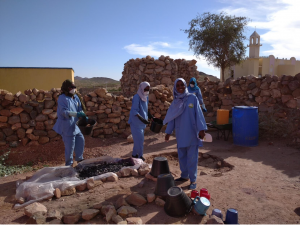The Project will operate in the Adwaac, Deydey-Weyn, Medeho catchment areas and to a lesser extent in the Petit Bara/Ambouli and Grand Bara basins (six basins), belonging respectively to the regions of Tadjourah, Ali-Sabieh, Obock, Arta and Dikhil. These areas are characterized by high poverty rates with sites where natural resources are often degraded: the majority of the selected localities are located in these pockets of poverty.
The choice of intervention sites has been based on four pre-established criteria agreed with the government, namely: (i) existence of untapped surface water resources (actual or potential), in sufficient quantity and quality; (ii) poverty index; (iii) population density or settlement dynamics; (iv) existence of agricultural potential and/or rangelands; plus (v) food security needs.
For all the localities, the project will capitalize on what has already been done in other interventions by mobilizing and maximizing the potential of water resources through sound management and development of the resource in the context of climate change. The project will thus strengthen the capacities of households, men/women and young people to cope with climate change through practical training (field schools and demonstrations) and local support in various areas of individual or collective management: technical advice, professional advice and organization, advice on the management of the water mobilized and rangelands, environmental education, nutritional education and food security, access to social services andIncome-Generating Activities (IGAs),especially for young people and women, for income diversification.
The main objective of PROGIRES is to improve the climate resilience of vulnerable ecosystems and increase the adaptive capacity of rural poor to respond to the impacts of climate change in Djibouti.
Overall, the IGAs will target 800 IGA holders, i.e. 4,800 beneficiaries. It is expected that at the end of the project, the most marginalized women and youth will be able to create and sustainably manage economically profitable activities.
| Project Component 1: Sustainable management of climate-resilient water infrastructure | USD 2,500,000 |
| Project Component 2: Adaptation of agro- pastoral systems to climate change and enhancement of the resilience of targeted communities | USD 1,590,000 |
| Project Component 3: Capacity building and knowledge management | USD 366,000 |
| Project execution cost (including M&E) | USD 465,000 |
| Total project cost (execution included) | USD 4,921,000 |
| IFAD management fee | USD
418,285 |
| Grant Amount | USD 5,339,285 |
Project Documents
| Attachment | Type | Size |
|---|---|---|
| Project document | 8 MB | |
| Inception Report | DOCX | 103 KB |
| PPR1 (for web) | 130 KB | |
| PPR2 (for web) | 138 KB |



